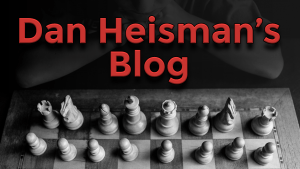Q&A with Coach Heisman Dec 21, 2012
The Mongoose Press Prize for the best question went to LazyChessPlayer for:
"One of the rules of blitz games is you can only move when your clock is running and you can not move until your opponent has pressed his clock. Although I heard of this rule I don't know how it works. Do I claim when he touches he's piece and it's still my time, do I claim when he lets go of the piece on a different square, do I claim at all. Also is there a waiting time allocated to me after I move my piece to press the clock, What am asking is if let's say the game starts and I play 1.e4 (and I don't press the clock and look at my opponent) then he plays ...e5 after 5 seconds (Do not claim because I didn't press the clock after I moved, or I claim it cause my opponent must wait for me to press the clock) Also if this is true how will a arbitior determine if my claim is valid or not."
The prize is a copy of my new book "The World's Most Instructive Amateur Game Book". This was the second of two shows this prize was awarded to advertise the book's publication - it is not something we do regularly.
Answer Summary - This question very much reminded me of the big dispute that Irina Krush was involved with at the US Woman's Championship in 2008. Take this link for her Open Letter to USCF. In general when two strong players play blitz chess (or get into mutual time trouble using the now rare zero increment option), one player is moving his/her hand to touch a piece as the other is going to hit the clock. Theoretically they should not touch their piece until their clock is running but no one stops to see exactly when the opponent, who is pushing the clock as fast as possible, actually touches the clock button. If the player pushing the clock would "fake" hitting the button, then the opponent would almost always be caught assuming they would hit it, and would touch their piece. But that is perfectly legal since it is reasonable they would assume someone is trying to hit the button as fast as possible, and not purposely catch them reaching for a piece. It's always been done that way. If you really feel your opponent is touching his/her pieces before you are hitting the clock, you can stop the clock and politely ask him/her to refrain, or you can get the TD to lodge a claim and let him/her decide. In Irina's case the international arbiters decided that her opponent was doing nothing unusual, although following the letter of the law was the basis of Irina's objection.
It was a very interesting show with many good questions. Thanks to Chess.Com TV Admin RookedOnChess for keeping the channel orderly.
Questions that received Honorable Mention:
Question by Josh:
What is the best way to count tempos in the endgame? As in a pawn race. I was wondering in this situation...
...if I can just let Black into the position and race against his A pawn verses my C pawn. I decided to get keep it simple and ended up winning because of the extra pawn but computer said the race would of won for white. Complicated though. I decided I couldn't count the tempos correctly so I kept it simple.
Answer Summary: In a position like this where you are a clear pawn ahead and winning, you wish to avoid racing if there is any way to win. Races always favor the player who is losing (who, of course, may be lost even in a race, but it sometimes gives them a fighting chance when otherwise they may be just lost). Rather than use the "If I go here and he goes there and then I go here and he goes there and then I go here..." method where it is easy for even a strong player to lose track after many ply, it is much more efficient to just count how many tempos each player will take to promote. Assuming it is your move, then compare how many moves it will take you to how many it will take your opponent:
- 1 tempo more for you means your opponent promotes first but then you promote
- equal tempos means you promote first and then your opponent promotes
- 1 tempo less for you and you promote when the opponent's pawn only gets to the 7th rank (which still may be a draw or an easy win depending on whether there are other pawns and which pawn the opponent has)
- 2 tempos less the opponent's pawn only gets to the 6th rank, which is usually an easy win.
After counting, if you have time, do it at least one or two more times to verify your result! One mistake can mean the entire game, so this is not the time to miscount. Keep in mind that, if there is a capturing sequence, if both players are forced to capture those tempos will even out, but sometimes they are not both forced to capture so, occasionally, this possibility will add complexity to the race.
Question by Gage:
Three part question; Why do you think chess has such a negative association? Why is it considered a nerds game? And do you think that this will ever change, perhaps with an aggressive advertising campaign, etc?
I would like to see it become more popular!
Answer Summary: Yes, we all would. Chess is a mental sport, so people that play it well naturally get identified with good mental capabilities (even though a study showed that grandmasters, on the average, were above average intelligence but not super-geniuses. The one thing they had in common was extensive experience playing chess!). In Europe chess is more popular than in the US. Strangely, in the US chess is shown in commercials and in the media to make it look like someone is intelligent. For example The Mentalist's boss, Theresa Lisbon, has a chess board set up in the back of her office at the California Bureau of Investigation. But if you do chess for a living in the US, then that's a different story! When people ask my wife "What does your husband do for a living?", she answers "He is a chess instructor" and they often follow with, "Can he make a living doing that?" I have suggested she then give a standard answer "No, he can't - he died!" 
Next, we have to separate the nerds from the geeks. The nerds are uncoordinated and have pencil holders; the geeks started Apple and Microsoft and are billionaires (well, some). I was a geek who played on the school basketball (guard), track (high jump) and football (quarterback but no, not starter) teams and was, with friend Don Beck, the Greater Philadelphia High School Doubles Bowling Champions for 1966-67 (yes, they still had 10 pins then!). So we geeks are highly coordinated and start big Dot.com companies; we formerly lost all the girls to the jocks (muscles over brains) til the girls - maturing into intelligent, discerning women - smartened up and went for the guys owning the companies  .
.
Question by Coffman: Hey Dan, Lately I have been very inconsistant at tournaments. I win against players rated 2000, but struggle against 1300 players. I go 5-0 one tournament and 1-4 the next. What should i do?
Answer Summary: There is an internet computer that plays the same strength every game. Yet its highest rating is almost 300 points higher than its average rating. So, you can imagine what happens to the ratings of humans who are not improving, much less ones who are; their results will vary wildly, and that is human. A headache can cost you hundreds of rating points in playing strength. A day where you feel sharp can differ sharply from one where nothing comes easy, mentally. So these fluctuating results will happen. Moreover, a 1650 should give a good game to a 2000 player, winning about 13% of the points, just as a 1300 should be able to give a good game to a 1650; these games are mostly going to be competitive. It's not surprising when they are.
However, having written all that, if you play too overconfidently against lower rated players, you can easily lower your expected results against them by playing too quickly or making "poor" threats in the hope that the weaker opponent will overlook it and give you an easy win (see The Three Types of Reasonable Threats). Those type of errors will result in a less than expected performance and/or your lower rated opponent giving a more difficult game than it should have been. One possible tip: If you hide your opponent's rating until after the game (not always possible), that can often help minimize this type of problem since you shouldn't take anyone lightly. Funny, but it just so happens I recently wrote a Chess.com blog on that very subject...



